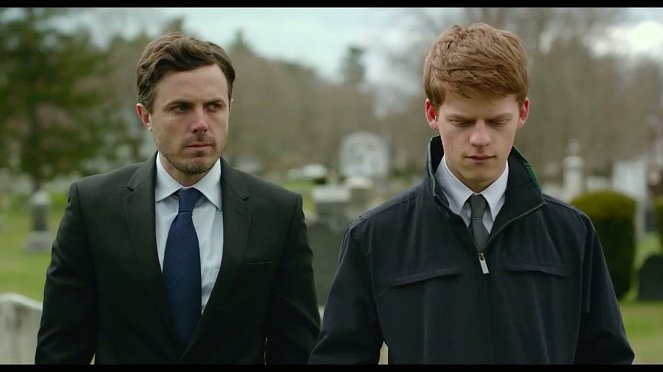Directed by:
Kenneth LonerganScreenplay:
Kenneth LonerganCinematography:
Jody Lee LipesComposer:
Lesley BarberCast:
Casey Affleck, Lucas Hedges, Kyle Chandler, Michelle Williams, C.J. Wilson, Heather Burns, Tate Donovan, Josh Hamilton, Matthew Broderick, Gretchen Mol (more)VOD (4)
Plots(1)
Casey Affleck stars as Lee, a man whose spare existence is suddenly ruptured when the death of his brother Joe (Kyle Chandler) forces him to return to the hometown he abandoned years before. Rocked by contact with his estranged ex-wife (Michelle Williams) and the revelation that Joe has made him guardian of his teenage son (Lucas Hedges), Lee is forced to face up to painful memories and new-found levels of responsibility as he reconnects with his family. (StudioCanal UK)
(more)Videos (7)
Reviews (13)
A drama that does not hold your hand, forces you to read between the lines, and does so on a canvas over two hours long that does not begin with careless and ordinary dialogues full of chatter. Casey Affleck has found the role of his life, Michelle Williams shines even in a smaller space, and Kenneth Lonergan has created a drama that is almost too absolute and overwhelming to be heartfelt. Still, I wish him all the success in the awards season.
()
With exaggeration and in big quotation marks it’s Nocturnal Animals for the lower middle-class or country people. It's slow, weaving and painful (in the spirit of Eastwood's films), playing out several plot levels and exposing painful life events and decisions, or the inability to cope with them, but it is more oversimplified and easier to read. The most interesting thing about it is that it is paradoxically so direct and non-cinematic, because half of the scenes are without music and with so much authenticity and energy that it feels like your next-door neighbour is living the story. A cinematic event, no doubt, just not for everyone and it will have to mature a bit more, but a must-see for film scholars.
()
This review contains minor spoilers. Manchester by the Sea is one of the most useful film simulators for living with a broken heart. You can either let tragedy paralyze you completely or you can maintain a certain detachment from it – as Lonergan does, and as the protagonists of Manchester by the Sea also try to do. The film does not restore the status quo or reassure us that everything will be all right again. The real catharsis and return to harmony captured in a few flashbacks do not come, just as deliverance and at least some form of satisfaction after a similar tragedy may never come in real life. This is not the only departure from the conventions of American family melodramas, which usually offer simple solutions to similar dilemmas. The tragedy is not caused by fate, against which one can do nothing, but by human error; the characters are not rendered in black-and-white and, unlike the protagonists of ordinary melodramas, they are largely unable to externalise their emotions. Rather, their emotions are expressed for them through flashbacks and solemn music, which at the same time make us aware of the constant (and paradoxical) presence of loss, of an empty place (even more painful on second viewing are the mentions of the children in the dialogue – the man who repairs the dripping faucet for Lee speaks about his sister and her children; the doctor reports that the nurse Bethany has just given birth to twin girls). Like the female protagonist of Lonergan’s previous film, Patrick and Lee mainly have to learn to overcome the communication barrier and to find adequate words to describe the misfortune that they have endured (as, for example, the man whose boiler Lee repairs at the end has no problem with it and who uninhibitedly launches into a story about his father’s death). Unlike Lisa, however, they do not act melodramatically, despite the melodramatic potential of the situations in which they find themselves. Conversely, even the scenes that are shot with operatic exaggeration are disrupted by their unwillingness to let themselves be fully overcome by grief (Patrick’s ringing phone during the memorial service). People die, but the lives of those they leave behind go on. Manchester by the Sea, a melodrama that doesn’t want to be a melodrama, is thus for me not only a superbly written and acted drama about insurmountable loss, but also a film that is both formalistically and stylistically inspiring. 85%
()
Formal austerity, characters that are difficult to penetrate and even more difficult to leave, the impossibility of communication and escape from one's own past, from one's own life. An excellently constructed script that, by gradually revealing the past, allows us to slowly become attached to the main character, with whom we also seem to be searching for a glimmer of hope in the bleak psychological darkness. Casey Affleck's performance is once again chillingly convincing and depressing, but the young Hedges or, for those few minutes, the mesmerizing Michelle Williams are not far behind. To my complete satisfaction, it lacks a slightly steadier pace, and at times I didn't entirely agree with the onslaught of the pervasive depression that tests the flow of tear ducts at the expense of maintaining pure authenticity. That said, the impression is very intense and the ending cinematically beautiful, life is a ungrateful bitch and Lonergan has an apt balladic way of telling it. 80%
()
A painful punch right to the heart. A film whose author must be on the same frequency as I, because I understood every scene. Everything was in its place, everything made sense. It’s been a long time since I felt 137 minutes passing so fast, even though on paper they should have dragged (and judging by the comments, they did drag for many people).
()
Gallery (111)
Photo © Roadside Attractions



Ads